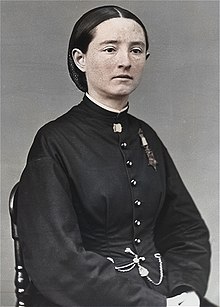d. February 21, 1919
A steadfast feminist, Mary Edwards Walker defied nineteenth century patriarchal society by refusing to live within the confines of gender-based roles. As a student, physician, and activist, Walker defined her place in society while paving the way for future generations of women. Diverging from the norm, Walker's liberal parents encouraged her and her five sisters to attend college and pursue careers. Her father, a self-taught doctor and advocate of women's dress reform, largely influenced Walker.
In 1855, Mary Edwards Walker graduated from Syracuse Medical College, becoming one of only a few female physicians in the country. She married fellow student and physician Albert Miller in an unconventional ceremony. Walker wore trousers and a man's coat and chose to keep her last name. The marriage ended four years later.
At the onset of the Civil War, having been denied a position as an Army medical officer, Walker volunteered as a nurse for the Union Army. During the next few years she served in several battles including the First Battle of Bull Run and the Battle of Fredericksburg. Despite her service, Walker often found herself at the scrutiny of male superiors who questioned her credentials.
The Confederate Army captured Walker in 1864 and held her captive for four months. The imprisonment proved to be a turning point in her career, winning her both respect and credibility. Later that year she became the first woman commissioned as Army Surgeon, earning a monthly salary of one hundred dollars.
The following year, Walker became the first and only woman in history to receive a Medal of Honor, the highest military honor in the United States. The bill, which President Andrew Johnson signed upon the recommendation of two major generals, reads:
Whereas it appears from official reports that Dr. Mary E. Walker, a graduate of medicine, has rendered valuable service to the Government, and.has devoted herself with much patriotic zeal to the sick and wounded soldiers, both in the field and hospitals, to the detriment of her own health, and has also endured hardships as a prisoner of war four months in Southern prison while acting as contract surgeon...It is ordered, That a testimonial thereof shall be hereby made and given to the said Dr. Mary E. Walker, and that the actual medal of honor for meritorious services be given her.
After the war, Walker continued to live a nonconformist lifestyle. A strong advocate of dress reform, she wore men's clothing exclusively and was arrested on several occasions for impersonating a man. In 1917, Congress revoked her Medal of Honor after revising the criteria for receiving the medal. Walker refused to return the medal, wearing it until her death.

No comments:
Post a Comment